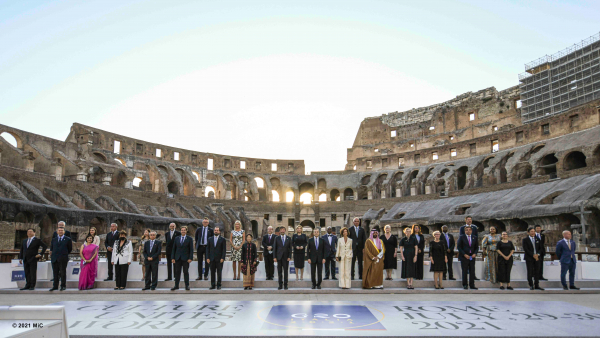The G20 Culture summit was held on 29-30 July in Rome, hosted in the evocative settings of the Colosseum and Palazzo Barberini under the Italian G20 presidency. The two-day event led to the adoption of the Rome Declaration of the G20 Culture Ministers, calling for culture to be integrated more into national economies as an opportunity for sustainable growth and international cooperation.
The meeting gathered G20 Ministers of Culture along with 40 cultural delegations, including ICCROM, under the banner, ‘Culture unites the World'. It focused on three interconnected pillars of action (People, Planet, Prosperity) and the promotion of digital transformation, capacity building, and economic opportunities in culture and creative industries, especially for youth. Also discussed was the need for greater commitment to a coordinated response to threats such as climate change, armed conflict, and the illegal trafficking of cultural property.
Together with other relevant international organizations, ICCROM will be a critical player in realizing the actions called for in the Rome Declaration. Several of these acknowledge the importance of work in which we are actively engaged, whether it be securing culture’s place within the United Nations Framework Convention on Climate Change, or fostering cross-sectoral and interdisciplinary cooperation between cultural heritage and disaster-risk management stakeholders at local, national, regional and international levels. Our expertise also lends itself to other stated ambitions, such as strengthening the contribution of culture to economic and social development through business management training for cultural professionals in G20 countries.
In his interview for the event, Director-General Webber Ndoro highlighted the work of ICCROM, established in the aftermath of World War II to restore and preserve monuments and sites affected by the conflict. Since then, ICCROM has developed restoration techniques and expanded its mandate to include the development of capacity building activities in the field of cultural heritage, strengthening its partnerships with its 137 Member States and promoting cultural diversity.
In the face of today’s challenges, ICCROM emphasizes international cooperation and people-centred approaches to engage with expertise on the ground, and to facilitate and enable communities to protect their heritage, while combining research, training courses and knowledge sharing about conservation.
“It’s important now to reflect on the terminology of cultural heritage in the light of these twin crises: the pandemic and climate change. I recommend the G20 reflect on cultural heritage, which is not only to be admired but is part of our daily lives and can be the solution to our problems. Its protection can no longer be postponed.” Webber Ndoro, Director General, ICCROM
As Dario Franceschini, the Minister of Culture of Italy remarked at the press conference, investing in culture means investing in sustainable economic growth and job creation.
Culture has a role to play and ICCROM is committed to it.


